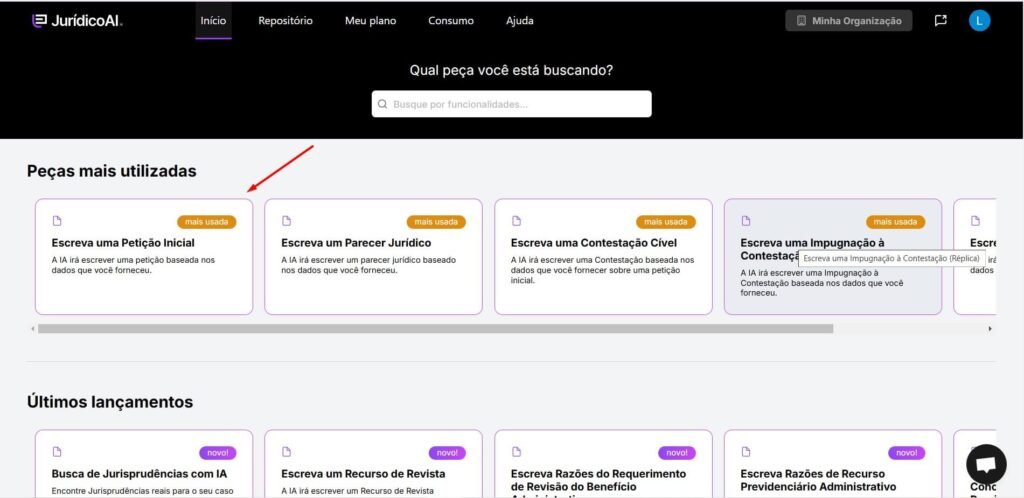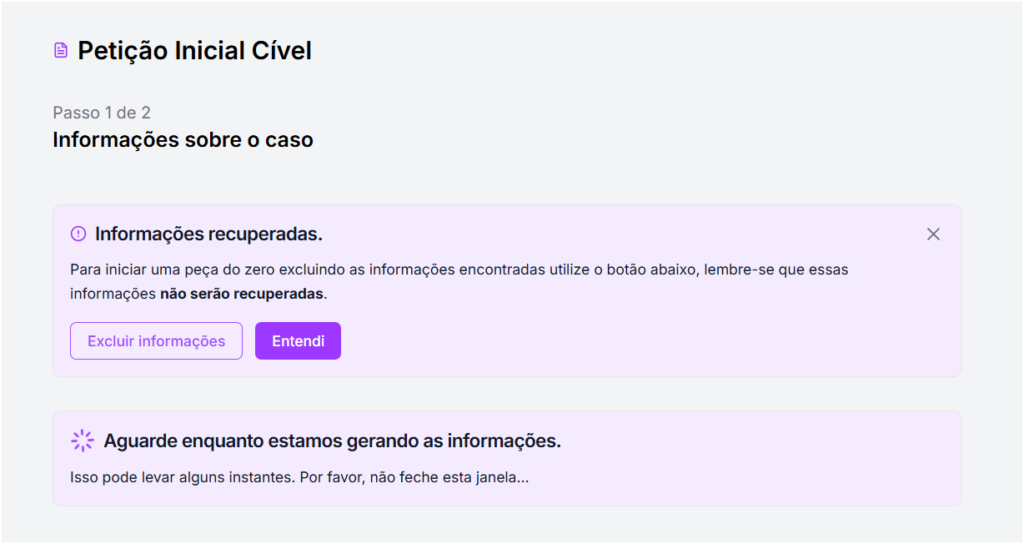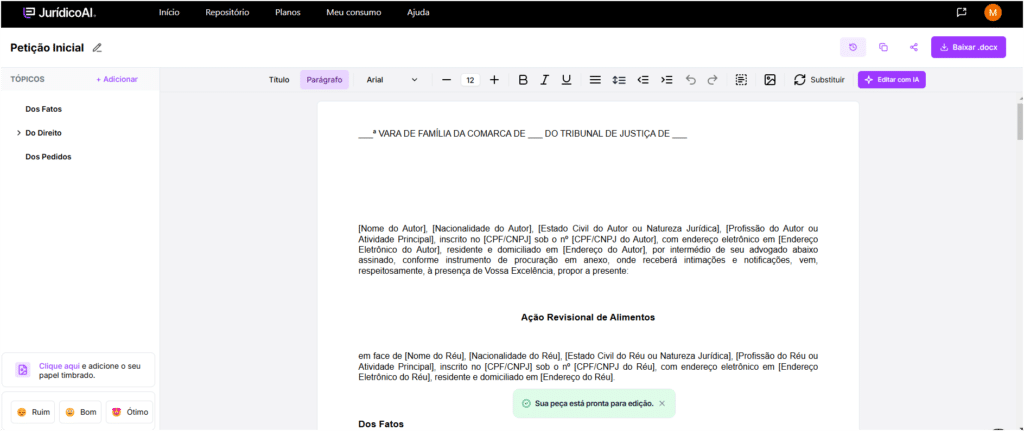Those who can demonstrate changes in their financial circumstances or the dependents’ needs have the right to seek a review of alimony amounts. To aid lawyers in this process, we have created a detailed template for the initial petition in a revisional action for reducing alimony.
Our model was developed using existing laws and relevant legal decisions, with a strong technical basis to back the revision request.
This model will help you create a clear and legally sound document, making the process more efficient. Review the contents and tailor it to your specific situation.
Discover further information about the Initial Petition utilizing Artificial Intelligence!
Model of the original request in a review action involving a reduction in foreign pensions.
I’m sorry, but it seems like you forgot to provide the text that you would like me to paraphrase. Can you please provide the text so that I can help you paraphrase it?
[Author Name], [Nationality of the Author], [Civil Status or Legal Nature of the Author], [Author’s Occupation or Primary Activity], registered under [CPF/CNPJ], with email at [Author’s Email Address], residing at [Author’s Address].
Revision of Food Allowance Reduction Action
In relation to [Food Name], [Nationality], identified with CPF no. [CPF], a minor is being represented by their legal guardian [Representative Name], [Nationality], [Civil State], [Profession], with CPF no. [CPF], and an email address at [Electronic address], residing at the mentioned address.
From the beginning stages
The necessity to provide Free Justice benefits
The Claimant cannot afford the procedural costs due to a substantial wage cut, making it necessary to provide free legal assistance as guaranteed by Article 98 of the CPC for individuals with limited financial means.
The examination of the Claimant’s financial status reveals that the mandatory food expense, set at 30% of their earnings, burdens a significant portion of their present income. Providing Free Justice is a step to guarantee access to legal recourse, as outlined in Article 5 of the Federal Constitution.
The enclosed paperwork demonstrates the Claimant’s financial status and emphasizes the necessity for legal protection. Therefore, it is vital to provide Free Justice benefits, enabling the Claimant to seek alimony adjustments without incurring procedural expenses.
The information
The Author, who is employed under the Consolidation of Labor Laws (CLT), was able to fulfill the financial obligation towards his minor child for two years by paying 30% of his net income as alimony, as ordered by a court decision. This arrangement was based on his financial situation at that time.
The Claimant’s financial situation has undergone significant and unforeseen changes recently, leading to a substantial wage reduction that severely affected their financial capacity. This situation has made the food obligation, as previously established, an excessive burden that jeopardizes their ability to meet basic needs.
The Claimant is not ineligible for alimony payments despite facing challenges. However, the current financial difficulties make it impossible to sustain the obligation without significant impact on dignity and survival. Adhering to the 30% fixed income percentage is now impractical and inconsistent with the principle of proportionality in food support.
The Claimant emphasizes that the child’s primary caregiver, who has better financial means and with whom the child lives, should also be taken into account in the current assessment of food provision. The financial contribution of the primary caregiver is crucial to evaluating the balance between the child’s needs and the parents’ ability to provide, as it is not fair for the Claimant to bear all the expenses for the child.
The food obligation revision, based on Article 1.699 of the Civil Code, is not only necessary but also fair and imperative. The Claimant aims to rebalance his ability to provide for the minor while adhering to the principles of proportionality and reasonableness in food relations.
Paraphrase: Legal regulations
The current review of food aims to restore fairness and equilibrium in the relationship between the parties by adjusting the alimony to reflect the applicant’s current financial situation.
We will show that continuing to enforce the obligation in the previously set forms is not feasible and excessive, requiring immediate intervention from this ruling to secure a dignified existence for all parties involved.
The Invaluable Alteration of the Dual Requirement-Option
The foundation of food legislation is based on the concept of need and possibility, as outlined in Article 1.699 of the Civil Code. This legal provision allows for the reassessment of food provision in response to changes in the financial circumstances of both providers and recipients. In this particular situation, the applicant’s documented substantial decrease in income demonstrates a notable shift in their ability to contribute.
The continued requirement for food support at outdated levels, based on a financial situation that has since changed, places a heavy financial burden on the individual seeking support, jeopardizing their ability to meet basic needs. Enforcing fixed food amounts without considering the individual’s needs and resources, as outlined in Article 1.694 of the Civil Code, would be unjust. Maintaining the current arrangement would violate this legal principle, pushing the applicant into a state of poverty and hopelessness.
The adjustment of the food requirement is mandated to align with the applicant’s updated financial situation, and the examination of the evidence will confirm the validity of the claims made, ultimately supporting the necessary change to be in accordance with justice and the law.
The Importance of Proportionality and Reasonableness in Food Pricing
The concept of human dignity, which serves as the basis of the Brazilian Republic according to the Federal Constitution, influences all aspects of the legal system, including family rights. In accordance with this core principle, Article 1.694 of the Civil Code specifies that financial support should be determined based on the recipient’s needs and the provider’s means.
It is important to ensure that the applicant can meet their basic needs while fulfilling their food obligation, without compromising their subsistence or ability to provide for other necessities like housing, health, and leisure. Achieving financial balance between the parties is essential in this regard.
The reassessment of spousal support is necessary to ensure it aligns with the applicant’s current income, maintaining principles of fairness and proportionality.
Genitor’s shared responsibility and family unity
Home legislation aims to safeguard the rights of minor children by emphasizing the shared responsibility of parents for their financial support, as outlined in Article 1.694 of the Civil Code. In this particular situation, the parent living with the child possesses superior financial means compared to the other parent, thereby underscoring their ability to provide financial assistance.
Family solidarity necessitates both parents to support their child financially according to their respective financial situations. The substantial decrease in the applicant’s income, along with the better financial position of the other parent, makes it crucial to reassess the distribution of financial obligations between the parents.
Redistributing the food responsibility fairly and proportionally according to each individual’s capabilities is not only just but also serves the child’s best interests by ensuring they receive the essential financial assistance for their healthy and balanced growth.
The examination of the parent’s financial capability within the context of family support highlights the importance of reevaluating child support to ensure a fair and equitable distribution of the responsibility between parents.
Incompatibility Between Food Requirements and the Dignified Sustenance of the Provider
Civil law states that the obligation to provide food should not undermine the sustenance of the person who provides it. The evident decrease in the applicant’s income affects his ability to pay the previously determined alimony without jeopardizing his own subsistence.
Maintaining the current food obligation would push the applicant into poverty and hinder his ability to meet basic needs like food, housing, health, and clothing. It is important to maintain financial balance between the parties to ensure the applicant can fulfill his food obligation while meeting his basic needs.
The reassessment of spousal support is necessary to ensure that the amount aligns with the applicant’s current financial situation, thereby upholding their dignity and capacity to support themselves.
The Early Tulle Concession’s Urgency
Article 300 of the Civil Procedure Code allows for early protection to be granted if there is a likelihood of the right being valid and a risk of harm to the outcome of the process. In this specific situation, the evidence provided in the petition, which shows the claimant’s salary reduction, supports the likelihood of the right to food review.
The risk of permanent harm or challenging repairs is clear, as continuing with the current food obligation seriously threatens the applicant’s ability to live decently until the court reaches a final decision. Each month, the applicant becomes more financially strained and anxious, facing the possibility of being unable to cover essential costs.
Granting early guardianship is necessary to immediately reduce alimony, easing the financial burden on the applicant and ensuring their proper sustenance until a final decision is reached in this case.
Granting early guardianship is crucial and essential to prevent irreversible harm to the applicant and to guarantee that the current legal proceeding achieves its ultimate goal of restoring justice and equilibrium in the relationship between the parties.
Purchases
In light of the information mentioned above and the usual paperwork, the current initiative is to seek the following topics.
- Providing early protection to decrease the alimony amount quickly, adjusting it to the Claimant’s current financial situation.
- Justice being provided free of charge, as stated in Article 98 of the CPC, is granted in the following manner.
- The Claimant’s citation by his legal representative to challenge within the specified timeframe.
- The Public Prosecutor’s Office subpoena is requested to be present during the current accomplishment.
- Scheduling a conciliation meeting according to the relevant process.
- The Claimant’s alimony payment percentage will be significantly reduced based on their current financial situation and the need-possibility factor.
- All evidence, including documents, witnesses, and experts, is to be presented in legal proceedings.
- The Required was found guilty and ordered to pay legal fees and other expenses.
The amount is determined by multiplying the difference between the current pension payment and the intended payment by 12, as stated in Article 292, III of the Civil Procedure Code.
Terms requesting a postponement.
Place, Date.
Advocate’s signature.
Discover additional information regarding the Initial Request.
Initial Request Employee: Complete Manual
Benefits of Using Artificial Intelligence in Petitions
Home Research Model [Full]
Initial Model in Prohibitory Action [Complete]
Initial Model for a Lawsuit for Compensation Due to Emotional Harm [Complete]
Initial Model of Food Action [Completed]
Use legal artificial intelligence to quickly reduce entire sections.
We are Legal AI, a top solution for attorneys, generating tailored documents rapidly using key case information to produce high-quality content with ease.
Here are the key advantages of utilizing our artificial intelligence for attorneys:
- Reduce the drafting time of procedural components by using a tool that produces well-structured minutes efficiently.
- Artificial intelligence customizes the writing based on the specific context of the case to ensure a coherent and tailored argument to the demands.
- The platform stays up to date with recent legal rulings and changes in laws to ensure that your documents comply with current legislation.
- By automating the production of parts, you free up more time to focus on strategy and customer service.
Try out the top AI technology designed for lawyers and witness how it can revolutionize your legal workflow!
Creating an initial petition in a revisional action to reduce an alien pension in legal artificial intelligence involves following a series of steps.
Filing an initial request for a reduction in alimony in Legal AI through a Revisional Action is quick and easy. Simply complete the form with your details and generate your petition in a matter of minutes.
Access the Legal AI website and sign up for an account if you are a new user, or log in with your existing credentials if you already have an account.

Select the “Write an Initial Petition” option after logging in to begin creating the document.

Step 3 involves stating the key components of the request, which includes:
- Identification of the author and the defendant is necessary to determine the qualification of the parties.
- Request for a pension review and reduction summarized.
- Reasons and basis: Suitable for evaluation due to a shift in the feeder’s financial capability.
- Further adjustments to the pension amount are requested, emphasizing the importance of the feeder and its potential.

IA examines the information and refers to a comprehensive law database to create a well-informed and current document.

Step 5 involves reviewing the initial petition created on the platform and making any necessary edits. The user-friendly interface enables easy customization of document theses before they are generated quickly and conveniently.

Click the “Generate Document” button.

Your Home Petition in Revisional Action with Reduction of Alien Pension is completed and available for use.

In order for Legal AI technology to effectively handle legal documents, it is crucial to supply comprehensive details about the case.
By entering the data clearly and accurately, you can ensure that your initial petition created by artificial intelligence is personalized and legally more precise and efficient!
Don’t forget to also explore our tutorial available in the question center!
Advantages of Utilizing AI in the Legal Field
- Reduce drafting time and minimize errors in writing by improving agility and accuracy.
- Count on a strong base rooted in existing laws and legal precedents for legal security.
- Customization and Adaptability: Tailor the agreement to suit the specifics of each deal while upholding high standards.
- Automating administrative tasks allows you to focus on strategizing and negotiating, increasing your business’s chances of success.
Creating the first petition has never been easier and more secure with Legal AI.
Experience it now and sense the change of depending on a technology that comprehends the requirements of lawyers.


